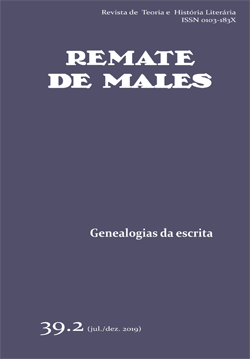Abstract
When the word “metalanguage” was created, the prefix “meta” acquired the connotation of “on”: metalanguage is that what is on top of the language. In Mythologies, the myth is described as a kind of metalanguage: it places itself on top of the object-language and inserts its own ideological meaning. But the intellectual who analyses the myth also uses a metalanguage. The intellectual is marginalised: his critical posture condemns him to stay at the margins of language used by the society. This problem will appear throughout Barthes’s works, but it will be particularly important in Discours amoureux. In the seminars for the preparation of A lover’s discourse: fragments, metalanguage is responsible for the exclusion from the pathos of love. To overcome the problem, the author develops a sophisticated theory. This theory disappears in the published book: the emergence of the pronoun “I” seems to solve this problem. By doing so, however, Barthes transfers the responsibility of the metalanguage to his readers. As we read, the fluctuation of the meanings that Barthes confers to the metalanguage, we realise that his texts offer different ways of seeing the relationships between the metalanguages and their object-languages.
References
BACHELARD, Gaston. A água e os sonhos; ensaios sobre a imaginação da matéria. São Paulo: Martins Fontes, 1989.
BARTHES, Roland. Mitologias. Lisboa: Edições 70, [197?].
BARTHES, Roland. Sistema da moda. São Paulo: Nacional/Edusp, 1979.
BARTHES, Roland. Crítica e verdade. São Paulo: Perspectiva, 1982.
BARTHES, Roland. Fragmentos de um discurso amoroso. São Paulo: Martins Fontes, 2003a.
BARTHES, Roland. O neutro. São Paulo: Martins Fontes, 2003b.
BARTHES, Roland. A imagem. In: O rumor da língua. 2. ed. São Paulo: Martins Fontes, 2004a, pp. 434-444.
BARTHES, Roland. Aula. 12. ed. São Paulo: Cultrix, 2004b.
BARTHES, Roland. Le discours amoureux [ed. Kindle]. Paris: Seuil, 2007.
BARTHES, Roland. Lexique de l’auteur. Paris: Seuil, 2010.
BARTHES, Roland. Roland Barthes por Roland Barthes. 2. ed. São Paulo: Estação Liberdade, 2017.
BENVENISTE, Émile. O aparelho formal da enunciação. Capítulo 5. In: Problemas de linguística geral II. Campinas: Pontes, 1989, pp. 81-88.
COSTE, Claude. Préface. In: BARTHES, Roland. Le discours amoureux. Paris: Seuil, 2007, posições 524-1099.
CUNHA, Antônio Geraldo da. Dicionário etimológico Nova Fronteira da língua portuguesa. Rio de Janeiro: Nova Fronteira, 1982.
HJELMSLEV, Louis. Prolegômenos a uma teoria da linguagem,.2. ed. São Paulo: Perspectiva, 2003.
HOUAISS, Antônio; VILLAR, Mauro de Salles (Eds.). Dicionário Houaiss da língua portuguesa. 2. impressão com alterações. Rio de Janeiro: Objetiva, 2007.
JAKOBSON, Roman. Linguística e poética. In: Linguística e comunicação. 14. ed. São Paulo: Cultrix, 1991, pp. 118-162.
PROCOPIO FERRAZ, Paulo. O avesso das frases: metalinguagem, palinódia e epanortose na obra de Roland Barthes. In: AMIGO PINO, Claudia et al. (Org.), Novamente Roland Barthes. Natal: IFRN, 2018, pp. 181-196. Disponível em: https://memoria.ifrn.edu.br/handle/1044/1660. Acesso em: 27 nov. 2019.
REY-DEBOVE, Josette. Le métalangage. Paris: Le Robert, 1978.
SAMOYAULT, Tiphaine. Roland Barthes [ed. Kindle]. Paris: Seuil, 2015.
SAUSSURE. Curso de linguística geral. 27. ed. São Paulo: Cultrix, 2006.

O periódico Remate de Males utiliza a licença do Creative Commons (CC), preservando assim, a integridade dos artigos em ambiente de acesso aberto.


